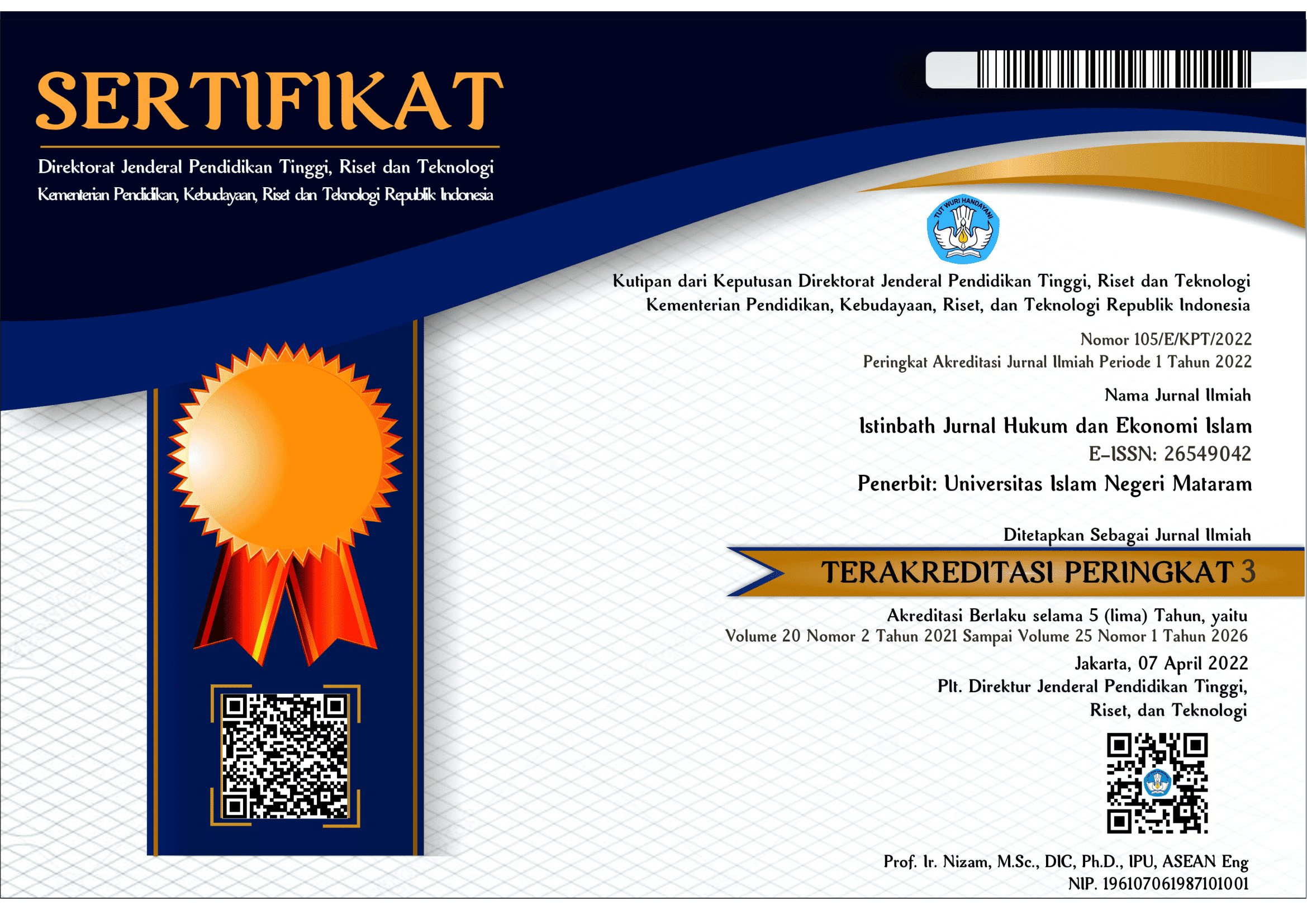THE STRENGTHENING HALAL TOURISM BASED ON PROPHETIC ISLAMIC PARADIGM THROUGH THE HISTORICAL SOCIAL INFERENCE OF THE SASAK, SAMAWA, AND MBOJO-NTB
DOI:
https://doi.org/10.20414/ijhi.v18i1.157Keywords:
Halal Tourism, Islamic Prophetic Paradigm, Historical Social Inference, Sasambo TribeAbstract
This article discusses the strengthening of halal tourism based on
the Islamic Prophetic Paradigm. Halal tourism built in West Nusa Tenggara is unclear and final about the direction and concept. Many parties are hesitant and criticized about the title of the halal destination carried by the regional government. Is it true that the government is committed to creating a religious and halal tourism environment? Is it in line with the historical social inference of the NTB community in wrapping the cultural customs of the tribes in the region?. This study uses the sociological method of jurisprudence, with the approach of the Islamic prophetic paradigm.Furthermore, it uses the procedure
of historical social inference to find convergence between Islamic values and the past, social aspects of the three major tribes in NTB. The results of the study show that the support and commitment of the NTB local government towards halal tourism that was built is based on Ahklak, Adab, and eastern culture. The main scheme is Muslim world tourists. This Akhlak, Adab, and east culture are very important to give a different color and show the local identity of an area. The halal concept was found through the convergence of cultural values and customs of the three tribes in NTB, namely the Sasak, Samawa, and Mbojo (Sasambo) tribes. It is contained and agreed upon in the norms and culture of the community, actualized at specific convergence points. The convergence of Islamic prophetic values with the historical, social benefits of the Sasak, Samawa and Mbojo tribes is seen in terms of halal food patterns, civilized patterns of association, clothing, and other economic trends. Like the Sasambo tribal philosophy “AdatBersendikanSyara’, Syara’ is based on the book of Allah’, which increasingly gives its Islamic identity. These paradigms and philosophies are the principal capital for the creation of regional halal regulations, accommodating local entities that are inherited and civilized
through local friendly entities.
References
Abdullah Ahmad in Muhammad Mutawali, The Implementation of Islamic Law in the King of Bima, Preprints, Created On Oktober 29, 2017, Last Edited: July 02, 2018.
Absori Dkk, Critical Prophetic Law Against the Non-Systematic Law Paradigm, Genta Publishing, Mold I, September Yogyakarta, 2015.
Ade Ela Pratiwi, Sharia Tourism Market Analysis in Yogyakarta City, Media Wisata Journal, Volume 14 Number 1, May 2016.
Aries Zulkarnain, Leadership in Customs and Rappang Tanah Samawa, Publisher Ombak, Cetakan 1, Yogyakarta, 2011.
Fahad Amin Al Hasan, Organizing Halal Tourism in Indonesia (DSN-MUI Fatwa Analysis on Guidelines for Organizing Tourism based on Sharia Principles), Al-Ahkam Journal, Volume 2, Number 1, January 2017.
Hafizah, Awalia, The Commodification of Halal Tourism in NTB in the Promotion of Islamic Tourist Destinations in Indonesia, Journal of Communication Studies, Volume 1, Ed 1, March 2017
Hashim Bin Muhammad Bin Husain Naqur, Al-Ahkam Al-Siyahahwa Atsaruha: Dirasah Syar’iyyah Muqaramah, (Riyadh: Dar Ibn Al-Jawzi, 1424).
Results of Interview with Adrian Pranata Ilham, Sumbawa, Indigenous Syara, Syara Bersendikan Kitabullah, Head of Tourism Promotion of the Sports and Tourism Agency of Sumbawa Regency, was also published in kabarsumbawa.com, November 2017.
Hilir Ismail, Maja Labo Dahu as the Philosophy of Living in the Present Context, Paper at the National Day and Performing Arts Seminar, Bima 2001.
Jamaluddin, Sasak Islam: History of Religious Social in Lombok (XVI-XIX century), IndoIslamika, Volume 11, Number 1, 2011/1432.
Nurjannah S, Islam, and the State: Study of Accommodation in Islamic Law in Banking and its Application Problems in Indonesia, Proposal for Dissertation of Students of the Doctoral Program in Postgraduate University of Muhammadiyah Surakarta,
on the seminar and tested on January 21, 2017.Nurjannah S, dkk | 195
Vol. 18, No. 1, Juni 2019
Novi Rizki Aulia, Social and Cultural Food of the Family of the Mbojo Tribe in Mataram City, Student Paper of the Ministry of Health Mataram, Tuesday 16 June 2015, novrizkiaulia1011.blogspot.com, accessed on Tuesday, 10 April 2018.
Rizkia Amelia Sania Putri, Critical Review of the Establishment of Regional Regulations Based on Customary Law and Islam as Actualization of the Values of Indonesian People, Legal Stage, Journal of the Indonesian Law Student Association Branch of Yogyakarta Special Region, Volume 1, Number 2, June 2015.
Shaykh Amin bin Abdullah al-Syaqawi, Adab Dressed, translated by Abu Umamah Arif Hidayatullah, Islamhousecom, 2014.
Sainun, Interaction of Islamic Value and Customary Values: Traditional Ceremony Study of the Sasak Lombok Tribe Society, West Nusa Tenggara, Sunan Ampel UIN Surabaya, Digilib.uinsby.ac.id, 2015.
Suarantb.com, Lombok Reaches Three Champions in “World Halal Tourism Awardsâ€,2016, Published on December 8, 2016.
State of the Global Islamic Economy 2014-2015 Report. Developed and Produced by Thomson Routers in Collaboration with Standard Dinar.
Toshihiko Izutsu, Relationship between God and Humans: A Semantic Approach to the Koran, Happened Agus Fahri Husein, Supriyanto Abdullah, and Amirudin, (Yogyakarta: PT. Tiara Wacana), 2003.
Ustadz Muhammad Wasitho Abu Fawas, Halal, and Haram Food Criteria, Muslim Entrepreneur Magazine 15-16 Edition, Volume 2 the Year 2011 M.





